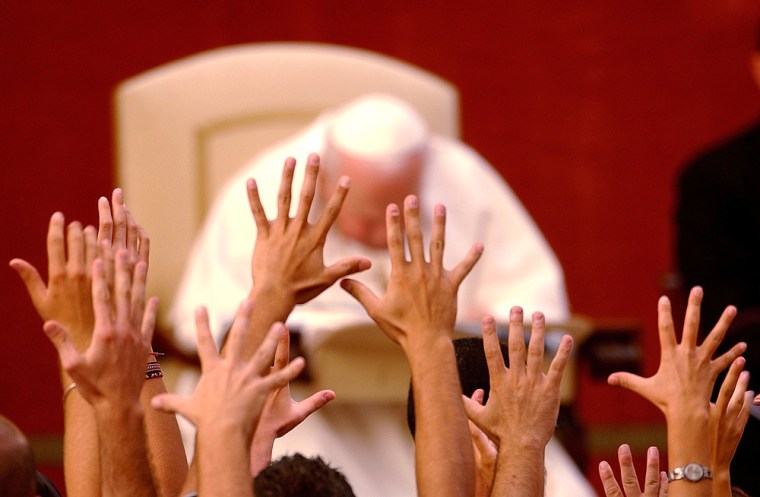As he lay dying, Pope John Paul II was aware of the presence of the crowd in St. Peter's Square below his apartment window and calmly viewed death as a "passage from one room to another," his longtime secretary said in an interview broadcast Friday night.
"He heard everything. He heard the square, he heard the prayer, the presence of the young people. The Holy Father heard, because he was conscious right to the end, almost to the end, even the last day," Archbishop Stanislaw Dziwisz told private Italian Canale 5's TG5 news in an interview in Krakow, Poland, where he will be installed as archbishop on Saturday.
Dziwisz served as Karol Wojtyla's secretary in Krakow, where the future pope served as cardinal, and continued to serve him in the Vatican until John Paul's death April 2 at age 84.
The archbishop was referring to the crowd of faithful that had gathered in the square below John Paul's apartment window to pray and keep vigil for the pontiff in the last days of his life.
Pope’s last words: ‘Totus tuus’
The former papal secretary said the last words he heard the pope utter were "Totus tuus," the pontiff's Latin motto for "Completely yours," dedicating himself to Mary.
A nun who was nearby John Paul in the pontiff's final hours told him that she heard the pope say: "Let me go to the Lord."
"We were at his side in these last moments," Dziwisz said. "For him, death was really a passage from one room to another, from one life to another."
"In the last hours of his life there was a great tranquility and peace. He knew that he was going to his destination, to the Lord," the archbishop said. "He had not one bit of fear" but was in "great peace the last day," Dziwisz said.
Shortly after John Paul's death, many among the crowd in St. Peter's Square shouted: "Sainthood immediately."
Within weeks of succeeding John Paul as pontiff, Benedict XVI said he was waiving the traditional five-year waiting period to start the process for eventual sainthood.
Referring to the certified miracle which is required for sainthood, Dziwisz said: "The Holy Father didn't want to hear talk of such things. He would say `If by chance something should happen, God makes miracles, not me. I pray. These are mysteries. Let's not talk of these things.'
"But there were so many miracles which happened during his life," his longtime secretary said, without elaborating.
Miracles that happen before death do not count under church rules for sainthood eligibility. A panel of church experts and physicians studies any miraculous healings attributed to the intercession of a sainthood candidate after death.
A saint while alive
Dziwisz said he felt he was near a saint while working at John Paul's side.
"I think that everyone knew this," Dziwisz said, interviewed at the Krakow archbishop's office where John Paul worked before his election in 1978 as the first non-Italian pope in 455 years.
Charismatic and often quite informal, John Paul was extremely popular with many Roman Catholic youths, drawing crowds of hundreds of thousands of them to prayer vigils and Masses during World Youth Days held in North and South America, Europe and Asia.
"Why did youth follow him?" Dziwisz asked. "Because they were searching for God through him, they were discovering the Lord in contact with him. Young people searched for the Lord, not John Paul II. They found him in contact through" John Paul.
